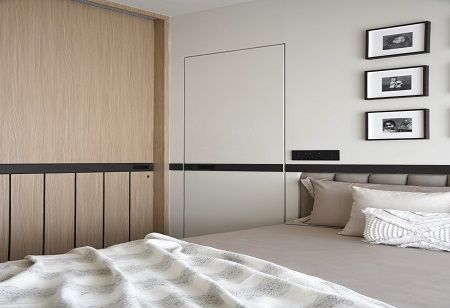
Tucked between the vibrant hustle and bustle of Mumbai, where life moves at a relentless pace, the newly crafted apartment by Architect Nayan Shah of Palindrome Spaces offers a rare retreat — aptly named "Sukoon."
This thoughtfully designed 780 sq. ft. space is not just a home; it is a quiet celebration of serenity and sophistication. Designed for a family of three, Sukoon is a masterclass in transforming a compact urban apartment into a serene abode where contemporary design blends with the warmth of familial bonds.
By prioritizing thoughtful spatial flow, blending minimalism with warmth, and embracing architectural elements like arches and curves, this home sets a powerful precedent for designers and homeowners seeking to craft their own urban sanctuaries.
The home testifies that with clever design interventions, breezy colour palettes, and a focus on flexibility, any space can be transformed into a calming retreat amidst the chaos of city life. With an overarching theme of soft pastels, smooth curves, and muted tones, Sukoon strikes the perfect balance between modern aesthetics and the timeless joy of togetherness. Every element here is an invitation to slow down, breathe deeply, and bask in the soft, calming light that dances across its thoughtfully curated interiors.
The moment one steps into Sukoon, an immediate sense of calm is felt. The arched entrance foyer, meticulously clad in a subtle laminate, serves as a gentle introduction to the home’s design philosophy — a harmonious blend of softness and sophistication.
The foyer isn't just a transitional space; it acts as a symbolic portal, welcoming you into a world where every curve is thoughtfully crafted, every shade is purposefully chosen, and every detail whispers a story of comfort and elegance.
Beyond the foyer, the living area opens up, bathed in an abundance of natural light that accentuates through the large windows. Here, soft beige tones meld effortlessly between spaces, rendering a unanimous theme to the abode with pastel hues, creating an atmosphere that feels both airy and intimate.
The centrepiece of this space is a custom artwork, a piece that speaks of simplicity through its fluid lines and a radiant, sunny circle that punctuates the wall. It’s a subtle reminder of the sun’s warmth and how light can transform spaces, infusing them with positivity. The living room's foundation is laid with nude-tinted, full-bodied tiles, chosen deliberately during the construction phase to add a sense of expansiveness and seamless flow.
At the core of Sukoon lies the open kitchen, a space that’s designed to bring people together. In Indian households, the kitchen is often the heart of the home — a place where not just meals, but memories are created. Here, the kitchen is more than just a functional space; it’s an area of connection, where conversations flow as easily as the dishes are prepared. Ar. Nayan and his team have thoughtfully incorporated a fluted glass sliding-folding partition, which allows the kitchen to merge with the living area. This isn’t just a kitchen for cooking; it’s a space where the modern Indian family can come together, share stories, and create new memories, all while surrounded by the soothing aesthetic that defines Sukoon.
Moving beyond the communal spaces, the apartment transitions into the private sanctuaries of the bedrooms, each uniquely tailored to reflect the personalities of its occupants, yet cohesively bound by the overarching theme of curves and soft lines. The son’s bedroom is a study in understated sophistication, a blend of playful curves with a touch of maturity.
Here, a palette of soft neutrals is punctuated by charcoal black accents, adding a subtle edge to the otherwise serene atmosphere. The bed-back, a beautifully detailed panel featuring grooves and a gentle curve, is more than just a design element; it serves as a canvas for cherished memories captured in black-and-white photographs. These personal touches add depth and character to the room, making it feel like a true reflection of its inhabitants.
In contrast, the parents’ bedroom transports you to a lush, tropical escape, albeit in a subtle, refined manner. This room is all about bringing the outdoors in, with a pastel mauve and green bed-back that draws inspiration from verdant landscapes. The soft, natural tones create a calming environment, perfect for rest and rejuvenation.
The bed is framed by wallpaper that subtly nods to the tropics, without overwhelming the space. Above, a specially designed curved ceiling alcove interacts harmoniously with the arched wardrobe doors, creating a fluid dialogue of shapes that envelop the room in a soothing, cocoon-like ambience. As the sunlight filters through the sheer drapes, it casts a soft glow over the entire space, making the room feel like a private retreat where time slows down.
One of the defining features of Sukoon is its careful attention to detail — every material, texture, and finish has been carefully chosen to elevate the space without compromising on comfort. The designers have struck a perfect balance between aesthetics and functionality. Handpicked jute and linen rugs lend a raw, tactile warmth to the floors, grounding the home in natural elements. The home’s curves and arches are not mere stylistic flourishes but integral elements that guide the flow of movement throughout the apartment.
Ar. Nayan’s thoughtful use of curves creates a visual softness, allowing the eye to glide effortlessly from one space to another, making the entire home feel like a cohesive whole.
At its core, Sukoon is a masterful blend of design and emotion. It is not just a collection of beautifully furnished rooms but a thoughtful narrative of how a home can embody peace, flexibility, and warmth. This Mumbai apartment is an ode to slow, intentional living — where every detail, from the nude tiles underfoot to the soft, pastel hues on the walls, is carefully crafted to create a space that nurtures its inhabitants.
We use cookies to ensure you get the best experience on our website. Read more...
Copyright © 2025 HomesIndiaMagazine. All Rights Reserved.